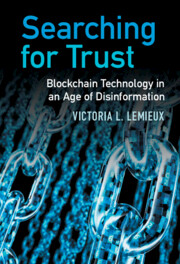Book contents
- Searching for Trust
- Searching for Trust
- Copyright page
- Dedication
- Epigraph
- Contents
- Preface
- Acknowledgments
- Part I Introduction
- Part II Trust
- Part III Disinformation
- Part IV Blockchain and Distributed Ledger Technology
- 6 The “Moral Defense of the Archive”
- 7 From “Archival Imaginaries” to Archival Realities
- Part V The Theory of the Future
- References
- Index
7 - From “Archival Imaginaries” to Archival Realities
from Part IV - Blockchain and Distributed Ledger Technology
Published online by Cambridge University Press: 01 April 2022
- Searching for Trust
- Searching for Trust
- Copyright page
- Dedication
- Epigraph
- Contents
- Preface
- Acknowledgments
- Part I Introduction
- Part II Trust
- Part III Disinformation
- Part IV Blockchain and Distributed Ledger Technology
- 6 The “Moral Defense of the Archive”
- 7 From “Archival Imaginaries” to Archival Realities
- Part V The Theory of the Future
- References
- Index
Summary
The discipline of “diplomatics” – originating in the seventeenth century to systematically test the authenticity of medieval documents – has more recently been adapted to the study of digital records and their systems. In establishing the necessary elements for the long-term preservation of authentic records, archival diplomatics provides one possible (and powerful) analytic framework and methodology for analyzing the trustworthiness of records, including those to be found in blockchain and distributed ledgers. Regardless of the type of blockchain and distributed ledger system under examination, each relies upon trust in the ledger and in the records the ledger contains. Yet each type of blockchain and distributed ledger system still has limitations when judged against archival diplomatic standards of records’ trustworthiness, which demands the accuracy, reliability, and authenticity of records. By gaining an understanding of the elemental requirements for trust in records (and in record systems), there is hope that the designers of blockchain and distributed ledger systems might continue to improve the evidentiary quality of blockchain records and recordkeeping.
Keywords
- Type
- Chapter
- Information
- Searching for TrustBlockchain Technology in an Age of Disinformation, pp. 143 - 176Publisher: Cambridge University PressPrint publication year: 2022



